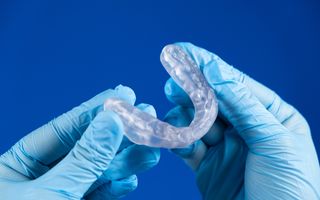
Custom mouthguards are a good option for those looking to protect their teeth, and can be used for sports or other applications such as for protection during sleep against teeth grinding.
A well-fitted, custom made mouthguard can protect your teeth and jaw by limiting the impact from contact and reducing the risk of damage to your teeth. Without one, sportspeople run the risk of damaging, chipping, breaking, or even knocking out their teeth, which can be a painful and costly problem to fix.
Ultimately, a mouth guard can protect your teeth just as much as it can protect your confidence in your smile.
What is a custom mouthguard?
A custom mouth guard is a thick piece of plastic that sits snugly around your teeth, protecting them from damage.
There are mouthguards that you can buy ‘off the shelf’ at pharmacies and sports stores. However, these are not made specifically for your teeth and are, therefore, usually not a very good fit. While they will offer more protection than nothing, they are not the gold standard when it comes to mouthguards.
Similarly, boil-and-bite mouthguards are available to buy over the counter. For these, you would boil the pre-made mouthguard in water to soften the plastic, then bite into it. This is a step up from one-size-fits-all mouthguards, but is not as fitted or protective as custom mouthguards.
The gold standard in mouthguards are custom made by a dentist or dental professional.

These are made by taking impressions of your teeth and gums, and having the mouthguard made to your exact mouth. This means every tooth will sit close against the mouth guard, leaving no room for it to move.
Sports mouthguards are most often used for contact sports, such as rugby or hockey. Players can (and do) receive knocks to the face that can easily damage teeth, which is why custom mouthguards are an essential piece of safety gear.
Mouthguards are also sometimes used for other applications, such as for those who grind their teeth in their sleep (bruxism). This common issue can wear away teeth over time, so a mouthguard will help to prevent that damage.
The advantages of a custom-fitted mouthguard
Custom mouthguards are extremely useful for keeping your teeth and gums in good condition, even when playing contact sports.
- Minimises and avoids damage: Custom-made mouthguards are the gold standard in minimising and avoiding damage from sports-related injuries, as their tight fit ensures teeth have a good layer of protection and that they can’t move during an impact.
- Comfortable wear: When a mouthguard is made specifically for your mouth, it is more comfortable to wear, and makes it easier to breathe than a non-custom mouthguard.
- Avoids costly, painful repairs: From chipped and broken teeth to knocked out teeth that require emergency dental treatment, a custom mouthguard can help to avoid the pain and trauma as well as the cost of getting these issues fixed.
How does a dental mouthguard work?
You might be required to wear a custom mouthguard to play your chosen sport, or your dentist might recommend one to help protect your teeth during sleep if you have bruxism.
During your mouthguard appointment at National Dental Care Buddina, your dentist will take impressions of your teeth. To do this, you will bite down into a soft clay-like material, and hold this pose for a minute or two. The dentist will remove the new impression and send it away to a lab.

It will usually take a week or two for the lab to create a custom-made mouthguard for your teeth. They will work with instructions from your dentist, which could mean adding a hard insert for very high-impact sports.
Once the mouthguard is ready, you will return to your dentist to pick it up and ensure it fits well. If you wear it often for regular sports, you may be advised to replace it once per year, but it’s important to bring your mouthguard to future dental check-ups so your National Dental Care Buddina dentist can check and ensure its strength and integrity.
What to expect from your custom mouthguard appointment
Getting a custom mouthguard is one of the quickest and easiest dental appointments you’ll ever go to. Here’s what to expect:
- Brush and floss before your appointment
- Your dentist will take impressions of your teeth with a special clay
- They will remove the clay impressions and your appointment is finished
- You’ll be in and out within 20 minutes
- It will take a week or two for the lab to create your custom mouthguard
- You will return to your dentist to pick up the mouthguard and ensure it fits well
If you need a custom mouthguard to play sports, get in touch with our friendly team today to schedule an appointment at National Dental Care Buddina.
Frequently asked questions
Custom mouthguards usually cost between $200 and $350, and are typically tailored for a more comfortable fit and better protection.
If you have dental extras, many health funds will cover the cost of a custom-fitted mouthguard. Check with your health fund provider to see what you are covered for.
Yes. You can get a mouthguard for grinding teeth. Those with bruxism typically grind their teeth during sleep when they are unable to stop this damaging habit consciously.
While you work on methods to stop the grinding, you can wear a custom mouthguard to protect your teeth from wearing down during sleep.
If snoring means you or your partner are kept awake during the night, you should first check with your general practitioner in case obstructive sleep apnoea (OSA) is the cause. It's important to get a diagnosis, as OSA can be dangerous and lead to accidents due to lack of sleep.
If you have obstructive sleep apnoea and it’s not severe, your dentist may suggest a custom-fitted mouthguard that will help prevent snoring. These oral appliances are used in conjunction with other methods of treatment including assisting weight loss, exercise, and adjusting your sleeping position.
A mouthguard in sports is designed to minimise and potentially completely avoid any damage to your teeth and gums. Many sports with high levels of physical contact, such as rugby and hockey, require players to wear mouthguards in order to protect teeth.
A good mouthguard will do this by adding a thick layer of protective plastic around your teeth, so even if you have a collision with another player, get tackled, or have some other physical clash, your teeth have a layer of plastic around them to absorb some of the shock, much like a helmet does for your head.
This minimises the risk of chipped and cracked teeth as well as broken and knocked out teeth.
No, it is not a good idea to sleep with your sports mouthguard in. If you need a mouthguard to help with bruxism (clenching or grinding in your sleep), you must use a mouthguard specifically made for this issue.
That’s because a bruxism night guard and a sports mouthguard are designed to be different.
A bruxism night guard does not cover your gums, so can be worn comfortably for long periods of time without risking your gum health. Night guards are also less thick and bulky for more comfortable wear, and are perforated with holes to allow water and saliva to pass through more easily and avoid bacteria building up.
Overall, only use a sports mouthguard for sports, and switch to a custom-made night guard for sleeping.
Technically speaking, a mouthguard will not stop you from clenching your teeth. However, it will protect your teeth from wearing down due to clenching or teeth grinding.
National Dental Care Buddina will work with you to find solutions to help you keep from clenching, such as finding ways to reduce your stress, so that you no longer need a mouthguard to protect your teeth.
